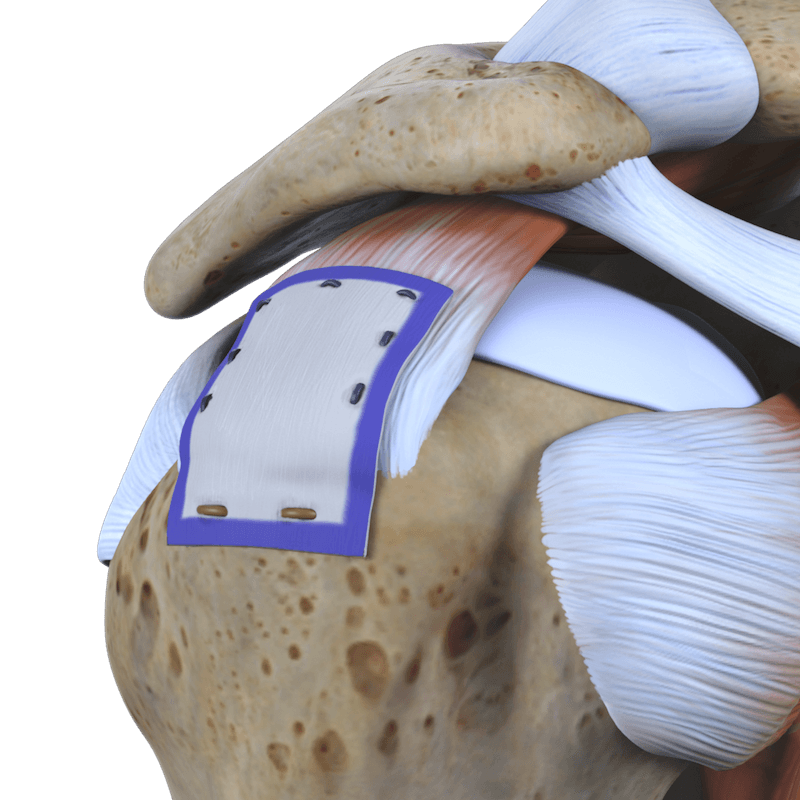Results of a study published online in the Journal of Shoulder and Elbow Surgery show Rotation Medical’s Bioinductive Implant consistently heals rotator cuff tears and mitigates tear progression.
Background
Rotator cuff damage is the most common source of shoulder pain. Traditional approaches to treating degenerate or torn rotator cuffs often do not address the poor quality of the underlying tendon tissue, and a significant number of these tendons, after standard treatment, either degenerate further and/or re-tear.
The Rotation Medical Bioinductive Implant is designed to address both the biomechanics and biology required to heal a rotator cuff tendon tear. Inducing new tissue growth at the site of implantation, results in increased tendon thickness and healing of tendon defects with new tissue growth.
The collagen-based implant is about the size of a postage stamp and it is part of the Rotation Medical rotator cuff system, which also includes disposable instruments that allow the arthroscopic procedure to be performed easily and quickly.
The newly published paper is entitled “Radiologic and clinical evaluation of a bioabsorbable collagen implant to treat partial-thickness tears: a prospective multi-center study.”
It enrolled 33 patients with chronic, degenerative, intermediate- (n=12) to high-grade (n=21) partial-thickness tears (11 articular, 10 bursal, four intra-substance, eight hybrid) of the supraspinatus tendon. Clinical outcomes were assessed using American Shoulder and Elbow Surgeons (ASES) and Constant-Murley scores preoperatively and at three and 12 months postoperatively. Magnetic resonance imaging (MRI) was performed to assess postoperative tendon healing and thickness at the original tear site.
One-year results of the multi-center study include:
· Clinical scores improved significantly (p<0.0001), and mean tendon thickness increased by 2.0 mm (p<0.0001); new tissue was indistinguishable from the underlying tendon.
· 94 percent of patients experienced complete healing or considerable reduction in defect size; consistent partial to complete fill-in of the original bursal, intrasubstance and articular partial-thickness tear defects were observed as early as 3 months postoperatively, with sustained efficacy through 12 months.
· 94 percent of patients either agreed or strongly agreed that they were satisfied with the results of their surgery.
· No tears progressed to full-thickness in patients who followed the postoperative rehabilitation protocol.
· No serious adverse events related to the implant were reported.
Investigator comments
“Partial thickness rotator cuff tears do not heal spontaneously and have a high propensity to increase in size and/or develop into full-thickness lesions,” said Theodore F. Schlegel, MD, lead investigator of the study and orthopedic surgeon at Steadman Hawkins Clinic Denver. “This study shows that the Bioinductive Implant not only repairs the tear and increases tendon thickness, but it also prevents tear progression. In addition, because the native tendon footprint remains intact around the location of the defect, the Bioinductive Implant may accelerate rehabilitation and recovery as compared with more conservative postoperative management when partial thickness lesions are taken down and repaired as full thickness tears.”
Company comments
“In addition to further demonstrating that our Bioinductive Implant increases tendon thickness and prevents re-tears, we are pleased that the majority of patients in this study said they were satisfied with the results of their rotator cuff surgeries,” said Martha Shadan, president and CEO of Rotation Medical. “As health systems transition to value-based care, data like these are becoming increasingly necessary to demonstrate the effectiveness of medical devices on indicators such as patient satisfaction, in addition to key health economic drivers that we are measuring in our REBUILD Registry Study.”
Source: Rotation Medical, Inc.
published: November 30, 2017 in: Clinical Studies/Trials, Shoulder

